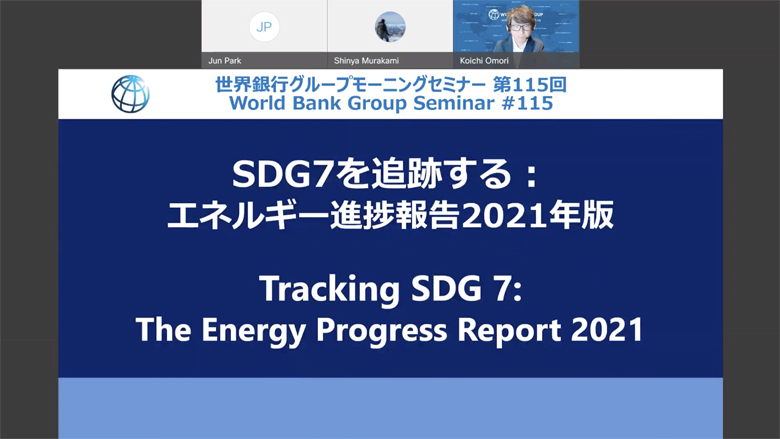During the last decade, a greater share of the global population gained access to electricity than ever before, but the number of people without electricity in Sub-Saharan Africa actually increased. Unless efforts are scaled up significantly in countries with the largest deficits the world will still fall short of ensuring universal access to affordable, reliable, sustainable, and modern energy by 2030, according to Tracking SDG 7: The Energy Progress Report, 2021 by the International Energy Agency (IEA) the International Renewable Energy Agency (IRENA), the UN Department of Economic and Social Affairs (UN DESA), the World Bank, and the World Health Organization (WHO).
At this seminar, Juliette Besnard, Energy Specialist, Energy Sector Management Assistance Program (ESMAP) shared the main points of the Tracking SDG7 report as well as the latest results of the Regulatory Indicators for Sustainable Energy (RISE).
Date/Time:
8am-9am, Friday September 3, 2021 (Japan Standard Time)
Speaker

Energy Specialist, Energy Sector Management Assistance Program (ESMAP), World Bank
Juliette is a member of the SEforALL Knowledge Hub team, focusing on energy access, and will continue operational assignments on access projects with regional teams. Previously, she worked on the Global Tracking Framework (GTF) and Regulatory Indicators for Sustainable Energy (RISE) on the energy access pillar; participated in a Sub-Saharan African power-agriculture nexus study; and supported the Renewable Energy for All project in Haiti. Before joining the World Bank, Juliette worked as a consultant for five years with Kurt Salmon Consulting and Weave Consulting, advising the public and private sector on energy infrastructure issues in Sub-Saharan Africa. She holds two MAs from Sciences Po Lille (France) and ESCP Europe (France).
Presentation material:
Tracking SDG7 2021 Key Findings (PDF)
Related Seminars
World Bank Group Morning Seminar
Subscribe to the World Bank Group Live Stream YouTube channel for more videos.
